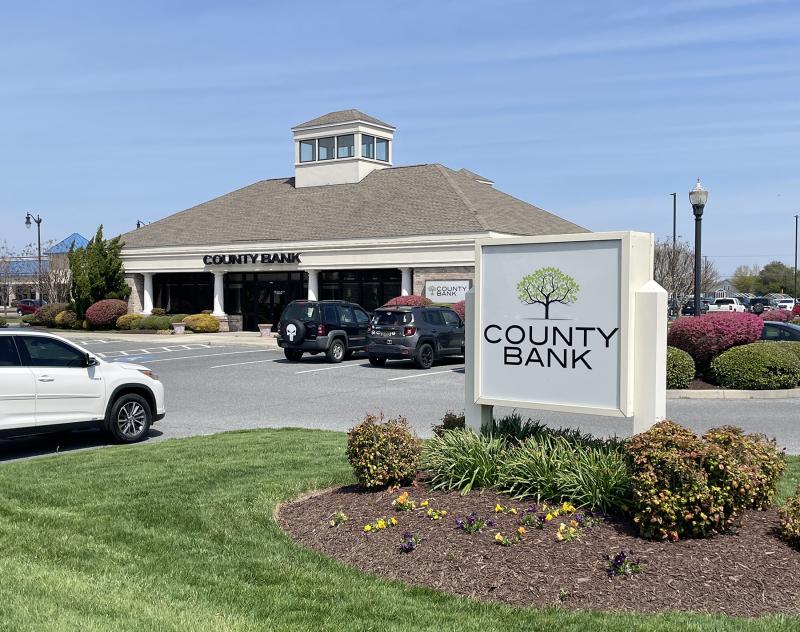As the banking world continues to wrangle with the recent collapse of several high-profile institutions, community bank leaders in the Cape Region say their financial sheets are sound.
“We don’t deal with venture capitalists and we don’t do any crypto,” said Dave Gillian, CEO and president of County Bank. “We’re in southern Delaware, and we gather our deposits all across southern Delaware and we lend our deposits across southern Delaware.”
On March 9, customers took out a staggering $42 billion from Silicon Valley Bank, leaving it with a billion-dollar deficit to become the second-largest bank failure in U.S. history. The bank primarily served venture capitalists and tech companies, which looked to SVB for startup capital.
The Monday morning after the Silicon Valley Bank crash, Gillian said, area bankers were in constant communication over what would happen next. He said all agreed their businesses were not at risk. “The Delaware banks are very strong; these are solid banks,” he said.
Depositors at County Bank are mostly individuals and families, or small businesses, Gillian said. The bank’s total assets are $602 million, a drop in the bucket compared to SVB’s billions.
According to published reports, SVB’s assets rose from $70 billion in 2019 to $114 billion in 2020, then nearly doubled to $209 billion in 2021.
Ninety-five percent of its total deposits were uninsured compared to County Bank’s 18% that is above the $250,000 Federal Deposit Insurance Corp. cutoff.
“Our asset quality is very high, we are very liquid, and that’s a significant departure from the other banks,” Gillian said.
On the balance sheet side, SVB had cryptocurrency exposure, but most importantly, it invested too much in mortgage-backed securities, which lost value as interest rates rose. SVB was in the process of switching to higher-interest Treasury bills for a better payout when it was hit by the $42 billion withdrawal run.
Gillian said mortgage-backed securities are sound investments if the maturation dates are staggered. “It’s not a mortgage-backed security issue; it's a question of time and a question of how big their investment portfolio was compared to their total assets.”
County Bank’s strong lending business sets it apart from SVB, he said.
“In most community banks down here, we lend our money,” Gillian said. “They were dealing with fintechs that primarily get their money from the markets, not borrowing ... They do have startup loans, but they couldn’t sell their loans. Who would want them? They’re risky.”
Local customers and sound investments are also the key to success at Community Bank, which has about $320 million in assets, said Jack Riddle, president and an owner.
Speaking on the collapse of SVB, San Diego-based Silvergate, which lost $44 million in Bitcoin investment, and New York-based Signature bank, which had billions in real estate loans, all made mistakes. He said they were all very large, multibillion-dollar banks that grew fast, focused on venture capital firms and crypto, and did not diversify. “Personally, I think they took some risks they should not have,” he said.
Riddle said Community Bank has a conservative business model backed by local customers and businesses. “No big risks, no fancy initiatives – just bread-and-butter safe banking,” he said.
Following the recent bank failures, the FDIC moved to guarantee deposits above $250,000 – a move that some experts say may encourage risky bank behavior.
As a result, Riddle said he expects to see an increase in premiums for FDIC deposit insurance, but he believes the system worked and an extra surcharge is negligible.
Congress and others in the financial industry, however, have criticized regulators, particularly those working for the San Francisco Federal Reserve, for failing to take action to avert the bank collapses. During a March 28 hearing on Capitol Hill, regulators shifted blame on bank officials, saying the Fed alerted SVB of risks but bankers failed to fix them.
Still, that means little to bank watchdog Sen. Elizabeth Warren of Massachusetts, who said on CNBC March 31 that regulators should have done more to make sure SVB’s balance sheet was sound.
“[CEOs] load up on risk, boost their short-term profits – SVB’s profits went up 40% in three years – pay themselves huge salaries, huge bonuses and then, exactly what we would anticipate, the banks explode and the taxpayers have to come in and backstop,” she said.

















































